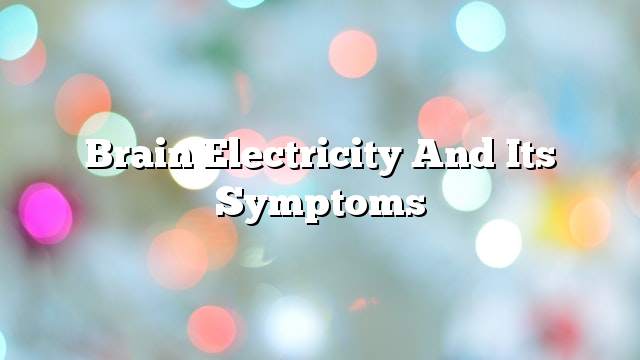Electrical brain
Brain electricity is one of the most common diseases of the nervous system. The brain has many neurotransmitters that include electrical waves. This is normal, but it is not satisfactory in many areas of the brain. It is a dysfunction that occurs in a region of the brain, causing an imbalance in the secretion of electrical charge. The term “excess electrical charge” refers to the person with epilepsy so that the patient is not embarrassed.
Symptoms of brain electricity
- A large headache may lose the patient awareness of what is frustrating, and called this case the name of a bout of spasticity, and this shift from one infected to another; as some of the injured shivering throughout the body, and others suffer convulsions throughout the body, and in these cases continue a bout a few Second, family members must have knowledge of the first aid provided to the injured person until he is taken to hospital in case the condition of the injured is bad.
- Hyperactivity and activity, in addition to lack of concentration.
- Difficulties in absorption and learning; this disease does not affect the absorptive capacity except in the case of damage caused by brain cells; that the genetic electrical charges do not cause problems in learning and absorption.
- The effect on walking and movement, and also pronunciation; sometimes the child is late to speak, or have stuttering during speech.
- Laryngospasm occurs when adults.
- Vertigo, feeling tired, and vomiting most of the time.
- Lack of breastfeeding in children, and low temperature or height.
- Excessive nervousness, blurred vision, pain in the body organs and numbness.
Causes of brain electricity
There are two main reasons for brain power:
- Lack of diabetes or hypoxia at birth or during the first week of age.
- Genetic factor of mother or father.
Diagnosis and treatment of brain electricity
Diagnosis of the disease is done through a magnetic resonance imaging of the brain, an electrical layout, a clinical examination, and a blood sample analysis. Treatment is performed by medication or surgery.
Important guidelines for patients with brain electricity
- Adhering to the health instructions provided by the doctor to the injured person and the obligation to take medicines.
- Not to swim, or to drive in order to preserve the life of the victim.
- Quit smoking and alcohol.
- When the seizure occurs, it is best to leave the patient’s body relaxed so that he can completely calm down, remove any solid object from him so as not to hurt himself, in addition to not move from place to place, and be careful not to enter anything into the patient’s mouth.
